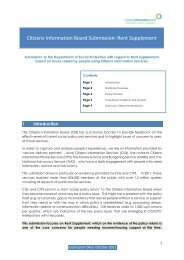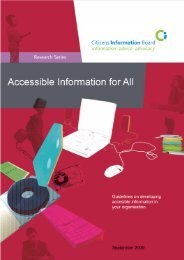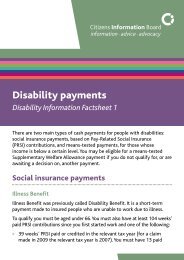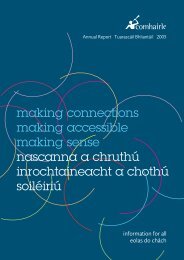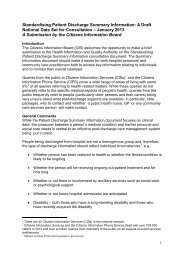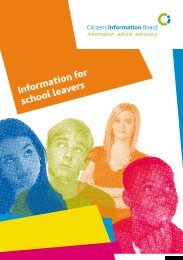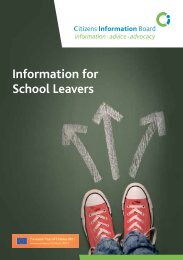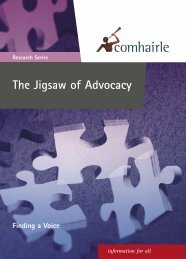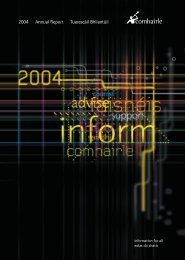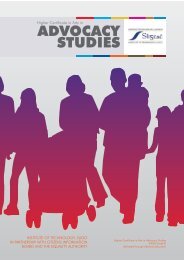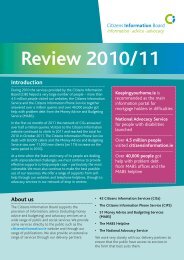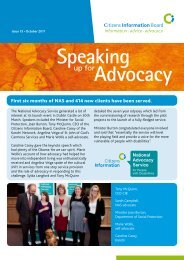Review of Sign Language Interpretation Services and Service ...
Review of Sign Language Interpretation Services and Service ...
Review of Sign Language Interpretation Services and Service ...
- No tags were found...
Create successful ePaper yourself
Turn your PDF publications into a flip-book with our unique Google optimized e-Paper software.
The first cohort <strong>of</strong> students on the Diploma in ISL Teaching <strong>and</strong> the Diploma inISL/English Interpreting graduated from the Centre in 2003. The first cohort <strong>of</strong>Diploma in Deaf Studies students graduated in 2004.Table 3.11 Centre for Deaf Studies graduates 2003-2005Diploma in ISL Diploma in Diploma in Total Number/English ISL Teaching Deaf Studies <strong>of</strong> GraduatesInterpreting2003 5 4 - 92004 13 3 5 212005* 11 4 7 22Number <strong>of</strong> 29 11 12 52graduates to date* This does not include students who completed supplemental tests in September 2005Source: Centre for Deaf Studies, August 2005From the table above it is apparent that a total <strong>of</strong> 29 ISL/English interpreters have graduated from the Diploma courseat the Centre for Deaf Studies to date.Currently no formal training is available in Irel<strong>and</strong> in Conference Interpreting, nor is any formal training available in thespecialised areas <strong>of</strong> Legal <strong>and</strong> Medical Interpreting.3.6.3 Continuing Pr<strong>of</strong>essional DevelopmentAt present there is no formal continuing pr<strong>of</strong>essional development programmeavailable to ISL/English interpreters working in Irel<strong>and</strong>. There are workshops <strong>and</strong>training sessions open to interpreters, run by organisations such as IrishAssociation <strong>of</strong> <strong>Sign</strong> <strong>Language</strong> Interpreters (IASLI). Participation in such events isvoluntary, <strong>and</strong> at the discretion <strong>of</strong> individual interpreters. There is currently n<strong>of</strong>ormal monitoring or regulation <strong>of</strong> ISL/English interpreters working in Irel<strong>and</strong>.3.6.4 Appeals/complaints proceduresCurrently, there is no <strong>of</strong>ficial complaints procedure in relation to SLI services inIrel<strong>and</strong>. Earlier this year, the Board <strong>of</strong> Irish <strong>Sign</strong> Link established a complaintssub-committee, which has been designated the task <strong>of</strong> reviewing the currentset up <strong>and</strong> developing an appropriate complaints procedure.The sub-committee is currently developing a complaints procedure based onthe process used by the Royal National Institute for Deaf People (RNID), inNorthern Irel<strong>and</strong>.Presently, complaints about interpreters who are members <strong>of</strong> IASLI are dealtwith by the Executive Committee <strong>of</strong> IASLI on a case by case basis.3.6.5 EthicsIASLI developed a code <strong>of</strong> ethics for interpreters in 1997. This ethical codeoutlines st<strong>and</strong>ards in relation to issues such as confidentiality, neutrality,responsibility <strong>and</strong> interpreter skills <strong>and</strong> knowledge.Irish <strong>Sign</strong> Link is not in a position to sanction interpreters if they breach the ethicalcode or if they are simply not delivering the quality <strong>of</strong> service that is expected.page 56 • <strong>Review</strong> <strong>of</strong> <strong>Sign</strong> <strong>Language</strong> <strong>Interpretation</strong> <strong><strong>Service</strong>s</strong> <strong>and</strong> <strong>Service</strong> Requirements in Irel<strong>and</strong>



